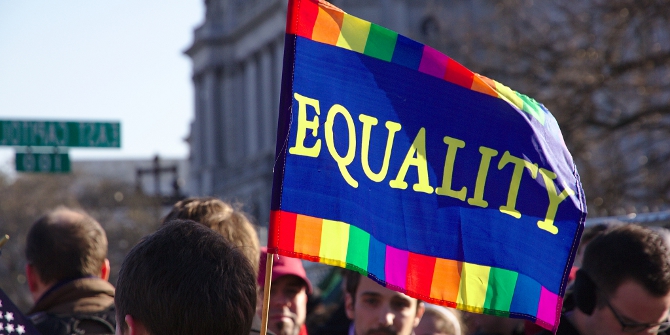
 Affluent Americans are more likely to have political influence compared to those on low incomes, which in turn means that the policies they want are more likely to be enacted. In new research, Tevfik Murat Yildirim and Alper T. Bulut examine the link between incomes and the likelihood of expressing political opinions. They find that those on higher incomes are 35 percent more likely to give an opinion on questions about what issues are important compared to those on the lowest incomes. This disparity in expressing opinions on politics and policies means that opinion polls are likely to mischaracterize public opinion on the most pressing problems facing the country.
Affluent Americans are more likely to have political influence compared to those on low incomes, which in turn means that the policies they want are more likely to be enacted. In new research, Tevfik Murat Yildirim and Alper T. Bulut examine the link between incomes and the likelihood of expressing political opinions. They find that those on higher incomes are 35 percent more likely to give an opinion on questions about what issues are important compared to those on the lowest incomes. This disparity in expressing opinions on politics and policies means that opinion polls are likely to mischaracterize public opinion on the most pressing problems facing the country.
Members of Congress are wealthy – in 2018 the median net worth of a US Senator was over $1.6 million, in the US House, that figure was nearly $500,000. Compare this with the median American family’s net worth of about $121,000. It’s clear that affluent Americans enjoy greater influence over various stages of the policymaking process than less-well-off citizens. This means that the policy preferences and priorities of lower-income citizens are underrepresented in policymaking processes, and this has important implications for the quality of political representation. These arguments have received substantial support from decades of research in various fields of study.
We know, for instance, that lower-income people are less likely to vote, contact elected officials and make campaign contributions, relative to the affluent. In new research which analyzes nearly 600 public opinion surveys conducted with 700,000 Americans between 1960-2015, we find that income-related gaps are evident even in arguably the most basic and essential act of democratic politics, the expression of opinions. Lower-income individuals withhold their policy priorities at greater rates than higher-income individuals due to diminished feelings of political effectiveness and sense of civic duty, which means that their opinions and needs are not as likely to be reflected by the work of the legislators who represent them.
Those on lower incomes are less likely to take part in, and have an opinion on, politics.
Those who are in a disadvantaged position in the socioeconomic hierarchy tend to have less material and emotional resources (e.g., time, money, social and political networks) that can help sustain their political interest and motivation. This explains why such individuals are less likely to undertake costly political initiatives such as campaign contributions. Furthermore, the vast majority of high-income earners vote, whereas only half of low-income Americans do so. What is more perplexing is lower-income individuals’ reluctance to even express political opinions in surveys. If lower-income individuals are less likely to voice their policy priorities and preferences, this would indicate that they are likely to be politically alienated and disenchanted with the political system.
Roughly 11 percent of all answers to the question covering what respondents felt was the ‘Most Important Problem/Issue’ (MIP) in the past sixty years were “Don’t know” or “no opinion”. To put this into perspective, ‘health care’ was mentioned by 3.5 percent, ‘civil rights’ by 3.8 percent, and ‘social welfare’ by 4 percent of the respondents as the most important problem in the same period. That is, nonresponse in policy priority questions has never been uncommon. However, a large portion of “don’t know/no opinion” answers were given by lower-income individuals. In statistical terms, our analysis shows that a hypothetical move from the lowest income quartile to the highest decreases one’s likelihood of giving “don’t know/no opinion” answers by almost 35 percent, controlling for other important factors such as education, gender, age, racial background, and residence characteristics. This is a substantively important difference. Strikingly, although income-related gaps in opinion expression shrink among the most educated, they do not disappear.

Photo by 愚木混株 cdd20 on Unsplash
Reasons for Opinion-Expression Gaps
But why do we see such a gap in the first place and what can we do about it? First, incomes are linked to other important factors, such as education, and social and political networks, that foster one’s political engagement. Cognitive limitations imposed by the psychology of poverty (e.g., stress and loss of political interest caused by economic hardship) can further diminish one’s civic skills and confidence in one’s ability to participate in politics. Not only do lower-income individuals lack the material resources necessary for active political participation, but they also tend to feel excluded and alienated from politics, which collectively contributes to their reluctance in expressing political opinions. This implies that income-related gaps are caused largely by structural inequalities that require long-term solutions.
Potential implications for media representations of public opinion
Lower-income individuals’ greater tendency to withhold their policy priorities paves the way for misrepresentation of policy priorities at the national level. A simple search on the Internet reveals a plethora of survey reports that provide aggregate-level statistics to describe attitudes toward policy issues in the US (e.g., “A majority of Americans support that…”). While samples at researchers’ disposal are usually weighted to match the core demographic characteristics of the likely electorate (e.g., age, gender, educational attainment, marital status; see this example poll by Times/Siena), income level is usually not considered in survey weights. Moreover, even if lower-income individuals are not numerically under-represented in samples, their attitudes toward policy problems still tend to be under-represented due to these individuals’ tendency to selectively give “don’t know/no opinion” answers to questions about what people consider to be important problems while answering others.
All this is to say that journalistic accounts presenting aggregate-level statistics from opinion polls tend to mischaracterize public opinion on the most pressing problems facing the country. To explore this possibility, we accounted for “don’t know/no opinion” answers in policy priority questions. If lower-income individuals, who tend to differ from higher-income individuals in their policy priorities, are underrepresented in MIP responses, then accounting for missing values in these responses might change policy prioritization patterns. Our analysis suggests that if all lower-income individuals gave a response to the MIP question, we would find that lower-income individuals prioritize such issues as civil liberties, crime, welfare, education, and health care at much greater rates than higher-income individuals. All in all, this implies that we know little about the policy agendas of traditionally disadvantaged groups in society, and that accounting for their lack of responses would substantially change what policies are prioritized.
- This article is based on the paper, ‘Income inequality and opinion expression gap in the American public: an analysis of policy priorities’ in the Journal of Public Policy.
- Please read our comments policy before commenting.
- Note: This article gives the views of the author, and not the position of USAPP – American Politics and Policy, nor the London School of Economics.
- Shortened URL for this post: https://bit.ly/3LCk3T6






